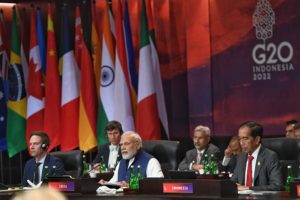Marketing post-COVID requires substantive orientation to technology
Anand Ramanathan, Partner, Deloitte India, asserts that post-COVID, demand generation through digital marketing will be an important area of focus. There will be an increased need to drive effectiveness on business metrics such as traffic generation, click through rates and online conversions, which will determine the success of digital campaigns and investments.

IBT: How has COVID-19 changed the business landscape and client expectations for B2B firms in your view?
Anand Ramanathan: COVID-19 will accelerate the digitization of the B2B market landscape from both a domestic and global standpoint. B2B firms will invest heavily in remote sales enablement and will use technology to provide a seamless experience to clients across physical and virtual channels. One view of the product, one view of inventory and one view of the customer will be critical pillars for building this seamless experience to clients. Enriching human experience from both a customer and employee perspective will dictate business utilization of AR/VR, AI/Machine learning and other exponential technologies for transitioning “high touch” experiences in an office environment into the online digital world powered by e-commerce, mobile apps and other convergence platforms.
IBT: In what ways does this landscape change expectations from the marketing teams of such companies and how could this reallocate marketing budgets?
Anand Ramanathan: Demand generation through digital marketing will be an important area of focus. There will be an increased need to drive effectiveness on business metrics such as traffic generation, click through rates and online conversions which will determine the success of digital campaigns and investments. Upselling/cross selling to existing customers will be a more efficient means to grow sales in contrast to new customer acquisition, which will be relatively expensive in the context of resource scarcity of a post COVID-19 environment. Lead generation will be driven by investments in vertical platforms that are specialized for a specific sector eco-systems. Effective influencer outreach and management will be critical for the B2B sector as a means of enhancing trust from a sales and marketing viewpoint.
IBT: Marketing professionals are compelled to embrace digital engagement due to travel bans across the world and major business events/conferences getting cancelled/postponed. What constraints does this forced shift place on customer networking and engagement, and what benefits does it offer?
Anand Ramanathan: Digital influence across the customer journey from lead generation to conversion to after sales management will dramatically increase. Marketing professionals will need to adapt to this new environment by curating and orchestrating content carefully to influence pre-purchase behaviour, which will be influenced through testimonials and reviews that will be widely accessed through online searches. They need to drive greater levels of consistency in brand communication between virtual and offline channels. Digital channels will provide much greater measurability of outcomes, which will make it easier to align marketing strategies to the impact that they create from a visibility, awareness and communication perspective.
IBT: The sales force has a major role to play in the customer outreach and engagement strategy of a B2B marketer. With rising adoption of digital channels, are some sales roles in B2B organisations under threat?
Anand Ramanathan: Remote sales enablement will be a big driver to changes in the sales organization. CRM, Dealer management systems, salesforce automation and commerce platforms will help drive greater channel and salesforce effectiveness as metrics on utilization, productivity and conversion will be readily available for the sales organization to tactically respond to market requirements in an agile fashion. Clear visibility on sales and marketing performance will help align planning and forecasting methodologies for a more profitable and lean sales and channel organization. Gamification will also play a big role in enhancing productivity and performance of the salesforce.
IBT: Also, as the digital space becomes more crowded, how can B2B brands stand out in terms of content approach, strategy, use of influencers, targeting, etc.?
Anand Ramanathan: The millennial generation is a lot more driven by social and environmental responsiveness that brands demonstrate and COVID-19 has further accentuated the need for brands to actively promote sustainability as a theme. Empathy and a concern for the collective beyond individual gratification has resulted on the spotlight shifting to marginalized groups such as immigrant labour and domestic help in households. Brand imagery that promotes convenience, health, hygiene, inclusiveness and social responsiveness will be a lot more successful in the current environment.
IBT: Harvard Business Review research estimates from an analysis of past recessions that 17% of companies didn’t survive, 80% hadn’t regained their pre-recession growth rate over three years while only 9% flourished (outperforming competitors by at least 10% in revenue and profit growth). What characteristics will separate the winners in the post-COVID period in your opinion in the B2B marketing space?
Anand Ramanathan: The companies that will emerge stronger in a post-COVID world will be those that drive business outcomes on growth, market share and profitability through greater levels of technology enablement in the sales and marketing function. The immediate focus should be on sweating existing digital assets more efficiently to drive higher sales from existing customers.
Critical foundational aspects, which will need to be strengthened include a CRM for having a 360 degree view of the customer and an online commerce platform to enable remote/virtual sales. Effective influencer management, campaign management and marketing/salesforce automation will be additional areas of investment that will be critical for surviving and thriving in a post-COVID world.
IBT: How will the pandemic change the approach of B2B companies towards hiring young marketing talent in your opinion? What kind of skills could be in greater demand? Will contractual employment or gig economy rise? Please elaborate.
Anand Ramanathan: Marketing will continue to play a very critical role in generating demand for products or services and building profitable brands that are trusted by customers, employees, partners and society. However, marketing in a post-COVID world will require a more substantive orientation towards technology. Customers will be more digitally engaged and higher levels of automation will make it easier to understand the impact of sales and marketing initiatives. Marketing talent in the future has to be extremely comfortable in using facts and figures to drive decision making. Managing a network of alliances and partnerships including start-ups in the gig economy will be critical as asset-light models hosted on the cloud using robust analytical models based on AI/Machine intelligence will drive business performance in the future.













Leave a comment